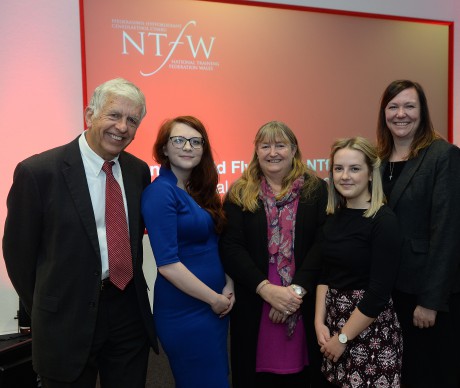
Regional Skills Partnerships influence direction of work-based learning

Minister for Skills and Science Julie James (centre) with speakers (from left) Dr John Graystone, Carmen Smith, NUS Wales deputy president, Megan Evans, National Society of Apprentices Wales and Sarah John, NTfW chair.
Work-based learning providers across Wales have been urged to ensure that their future strategy is influenced by employment skills plans produced by the country’s three Regional Skills Partnerships, which identify priority sectors for skills investment
The call came from Sarah John, chairman of the National Training Federation for Wales (NTfW), at the organisation’s annual conference, ‘Securing the future in a time of change’, at Cardiff City Football Stadium.
The NTfW represents more than 100 organisations involved in the delivery of learning in the workplace in Wales.
Mrs John, a director of Acorn Learning Solutions, Newport, told the 180 conference delegates: “Now that the Regional Skills Partnerships have produced their employment action plans and identified the priority sectors for skills investment, work-based learning providers must read and reflect their findings in their organisational planning, as these will inform future decisions on funding.”
She said the NTfW would continue to work closely with other organisations with similar priorities in the employability and skills sector to collectively approach future challenges and identify appropriate solutions.
“As a start point, NTFW has been working on a ‘Creative Solutions’ document to send to the Minister for Skills and Science, Julie James, proposing ideas on how the network could create more apprenticeship opportunities and career pathways in priority sectors, reflecting the future skills needs identified by the Regional Skills Partnerships,” she added.
She welcomed the Welsh Government’s pledge to support a minimum of 100,000 high quality all age apprenticeships to be delivered over the next five years. “The clock is already ticking for us as a network and we must work together and with Welsh Government officials to ensure that this commitment is not just met but exceeded,” she told delegates.
“As a sector, we have an enviable record of adapting to change to ensure that our programmes and delivery models meet the needs of many. As we look forward to another period of significant change for the work-based learning sector in Wales, it is more important than ever that, as a network, we play a central role and do not simply allow change to happen to us.
“The employability and skills arena is now more than just delivering apprenticeships and traineeships. It is going to be exciting and we need to rise to the challenges that are coming.”
She said there had been important changes in the past year, including the Brexit vote and more changes were on the horizon with the introduction of the Apprenticeship Levy and a tender process for work-based learning delivery contracts.
Wales’ Minister for Skills and Science Julie James also emphasised the importance of the three Regional Skills Partnerships to highlight priorities to address skill shortages in growth sectors and emerging job categories. She urged learning providers to be responsive to the needs of the Welsh economy.
She said the Welsh Government was committed to reshaping employability support and a new policy on apprenticeships.
“The All-Age Employability Programme will be more flexible and responsive for all ages and better meet the needs of those requiring support to gain and retain work and to progress within work,” she added. “The programme will be informed by labour market intelligence from the Regional Skills Partnerships, which are at the centre of this vision.”
She referred to the Welsh Government’s ‘Taking Wales Forward’ strategy to create better jobs through a stronger and fairer economy. Fundamental to the skills agenda was a high wage, high skill economy.
She praised the NTfW for contributing towards a successful ‘Team Wales’ approach on skills delivery.
Other speakers included Carmen Smith, NUS Wales deputy president and Megan Evans, of the National Society of Apprentices Wales who is a social media for business apprentice with learning provider ACT Limited.
They called for the better promotion of apprenticeships as career pathway options in schools and said the views of learners should be at the heart of decisions made about apprenticeships. Miss Smith revealed that the NUS would be launching an apprenticeship quality charter to establish minimum standards.
Another keynote speaker was Tony Wilson, the Learning and Work Institute’s director of policy and research.
Conference delegates also attended a stimulating selection of workshops during the day.
More News Articles
« Inspirational success stories celebrated at Apprenticeship Awards Cymru ceremony — Sarah and Paul appointed to lead NTfW during period of change »

